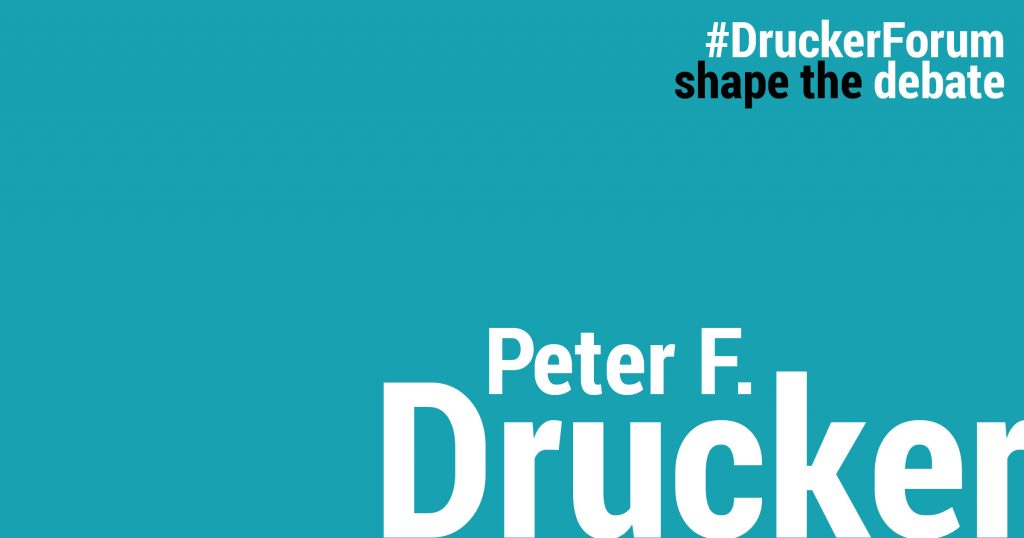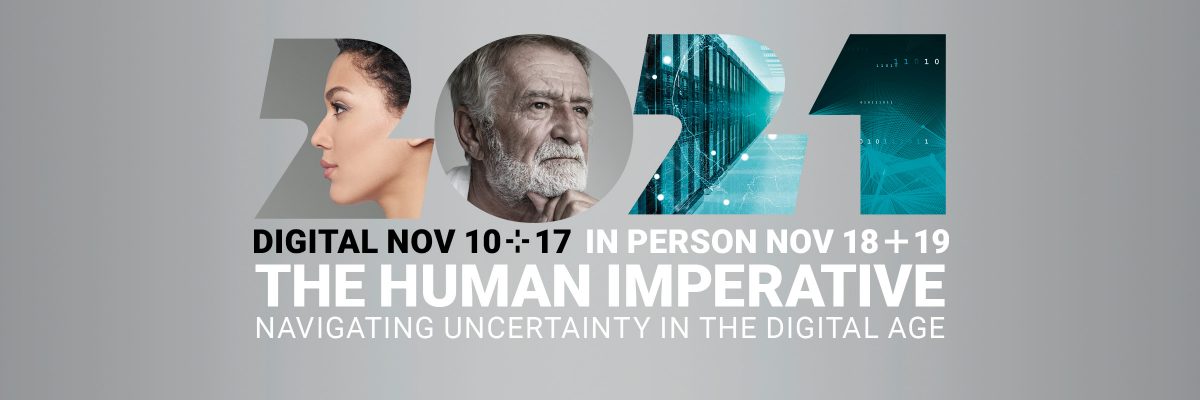
Nearly sixteen years after his death at 95, Peter Drucker’s influence and impact on individuals and organizations is as strong as ever. The availability of his books, articles, and videos is wider than it was during his lifetime, and there are several institutions worldwide dedicated to preserving, curating, extending, and building upon his legacy.
Why do his ideas seem so alive and vibrant in a world vastly changed from 2005? One clue comes from a fascinating 1998 Inc. magazine interview, in which Drucker provided a look into his thought process: “None of my books or ideas mean anything to me in the long run. What are theories? Nothing. The only thing that matters is how you touch people. Have I given anyone insight? That’s what I want to have done. Insight lasts; theories don’t.”
Drucker Forum 2021
That is an astounding statement from someone who is known, at least by some people, as a management theorist. It relates to his lifelong emphasis on people and their relationships with one another, inside and outside of the workplace. He was generous with his time, maintaining relationships with former students and clients throughout his life. The insight focus is also displayed in the subtitle of his best-selling 2004 book The Daily Drucker: 366 Days of Insight and Motivation for Getting the Right Things Done, a compendium of beautifully-curated material organized by topics such as People, Management, Managing Oneself, and Work and Human Nature.
A related key to Drucker’s ongoing impact can be found in the 2014 book A Year With Peter Drucker: 52 Weeks of Coaching for Leadership Effectiveness, by Joseph A. Maciariello, Drucker’s friend, book collaborator and teaching colleague at the Drucker School, who died in 2020. On the next to last page, in referencing Drucker’s well-known legacy question of “What do you want to be remembered for?,” he writes the following: “We have seen that if we, like Peter Drucker, take an eternal view, only people last. Therefore, it is what we do in and for the lives of people that is most likely to outlive us.”
Drucker approached life and work from a big-picture perspective. He thought and acted in long, not necessarily linear time frames; taking in history, as well as the future. “The future that has already happened,” he has written, “is not within the present business; it is outside: a change in society, knowledge, culture, industry or economic structure. It is, moreover, a major trend, a break in the pattern rather than a variation within it.” Seven months before his death, he remarked that “the people I have seen who were happy even after being successful are the people who want to leave something behind. A hospital that’s working, a company that’s working, whatever, or who are not money-focused, but achievement-focused, because that you’re never finished with.”
Drucker knew that the timeless wisdom in his body of work was not just for his students or consulting clients. It could have profound effects on millions of other people, during and after his lifetime. (My interpretation is somewhat different from the first sentence of Drucker’s interview quote. Countless people derived wisdom from being in his presence, yet the “books and ideas” remain carriers of those insights.) Drucker’s profound insights were drawn from his own experiences as a writer, professor, and consultant; his wide reading of various forms of literature, and his love and appreciation for art and music. For instance, in an interview coinciding with the 2004 publication of The Daily Drucker, he said “I always read a little in the Bible — mostly either the Psalms or the Epistles of St. Paul. Just now I have begun re-reading the Epistles and find them very exciting, and full of insights earlier readings didn’t reveal.” His experience also included teaching Japanese art at Pomona College in the 1980s, and writing two novels during that decade, The Last of All Possible Worlds, and The Temptation to Do Good.
One’s personal qualities and values, and whether or not a person wants to improve the lives of others, also radiates from Drucker’s work. This baseline of integrity and empathy is more important than the mechanics of how a particular task is accomplished.
Drucker proposes in his 1969 book The Age of Discontinuity a regimen of self-reflection by asking yourself existential questions, such as “Who am I? What am I? What do I want to be? What do I want to put into life, and what do I want to get out of it? And what do I want to be remembered for?” Each of us will respond differently at different stages of life. Yet if we keep in mind the Drucker focus on fundamentals and first principles, and his eternal point of view, we can perhaps meet the challenges of today and tomorrow in new and improved ways.
About the Author:
Bruce Rosenstein is Managing Editor of Leader to Leader, and author of Create Your Future the Peter Drucker Way, and Living in More Than One World: How Peter Drucker’s Wisdom Can Inspire and Transform Your Life.
This article is one in the “shape the debate” series relating to the 13th Global Peter Drucker Forum, under the theme “The Human Imperative” on November 10 + 17 (digital) and 18 + 19 (in person), 2021.
#DruckerForum


i continue to suggest Drucker’s most important thoughts on a ‘human imperative’ reside within New Realities. it is not where he stated business is “in and of society” (albeit that is the ultimate human imperative) but it is there he highlights salvation by society versus economic imperatives. we should all use Drucker as part of our own knowledge thinking but in today’s world, with today’s challenges, it is quite possible we should be focused on business’s role in a community and as part of the fabric of society (and cascading consequences, i.e, how we ask people to think and act in a business impacts what they say and do at the kitchen table when they go home and impacts how they view the workings of the community they reside in). organizational design is actually societal design. is that not the greatest human imperative business can impact?